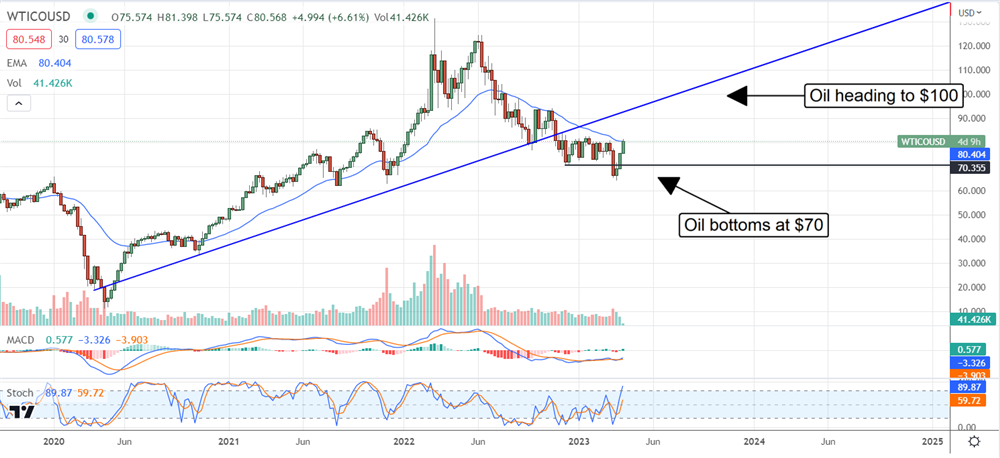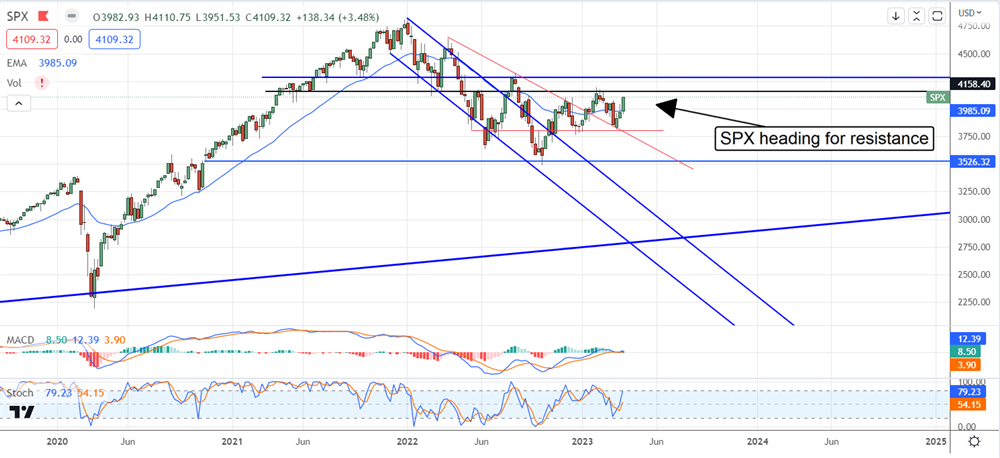What OPEC's Oil Cut Means For Investors OPEC+ cuts production and oil prices surge. The IEA predicts demand will outpace supply in 2023 so prices are heading even higher.
This story originally appeared on MarketBeat

OPEC+ surprised, no, shocked, the market with plans to cut oil (NYSEARCA: USO) production by 1.16 million barrels per day. Aside from the immediate impact of higher prices, this move has far-reaching repercussions that could result in the S&P 500 (NYSEARCA: SPY) reaching new post-pandemic lows. Saudi Arabia says it is necessary to "stabilize" the market, but it will line the pockets of all oil producers.
Regarding the price of WTI, it was up as much as 8% following the news and is confirming support at the $70 level. The question is whether the price action moves sideways or completes a total reversal, and the oil analysts are already talking about $100 oil. Looking at the charts and the demand outlook, $100 is a cautious target that might be reached within weeks.
The International Energy Agency's March report is troubling. The agency expects demand to accelerate sharply throughout 2023 and reach record highs before the end of the year. Demand is expected to hit 102 million barrels daily compared to February's 101.5 million BPD production rate. Take out the 1.16 mbpd OPEC+ is taking out of the market, and supply will run just under 2 million bpd short of demand. That will underpin the price action and could easily lead the oil price to new highs, given the onset of the summer traveling season. The IEA says increased air traffic and China's reopening are to blame.

Windfall Profits Will Keep Falling In The Energy Sector
The Energy Sector (NYSEARCA: XLE) has been leading the market regarding earnings growth due to the rise in oil prices. That expectation cooled off with the correction in oil prices but is now reinvigorated. As it is, the Energy Sector is expected to post a YOY earnings decline of nearly 20% for the year, but investors should expect that to change. With oil prices rising, the consensus figures for Q2, Q3 and Q4 earnings growth should rise again. This means another year of windfall-quality profits that will aid balance sheet improvements, investments in green and greener technology, share repurchases and dividend increases.
The broader S&P 500 will not fare so well. Energy is a leading input cost for all businesses and will cut margins. This will lead to another round of earnings growth revisions that could put the S&P 500 into negative territory for the year. The 1st half is already expected to see negative earnings growth of roughly 4%, while the back half should return to growth. The 3rd quarter consensus is only 2.3%, with the year at 1.5%, it won't take much to get those numbers into negative territory, and then there is inflation to discuss.
OPEC+ Sends Wake-Up Call To Central Bankers
The rise in oil prices is most troubling for its impact on inflation. The oil price rise will reaccelerate inflation and leave world central bankers no choice but to remain hawkish. The FOMC said it would only hike interest rates 1 more time this year, but that is an unlikely event. Inflation is still high at over 4.5%, so the Fed must remain active until there is proof the fight against inflation is over. This means increasing economic pressure and the chance more banks will fail.
The S&P 500 has been rallying, but that move is ending. The index is fast approaching resistance in the range of 4,100 to 4,300, and it will likely cap gains. The question is whether the market will reverse course, return to lower levels, or remain resilient and provide support within the 2023 trading range. A move to the 3,900 level is possible, and a move below may find support at 3,825, which is the bottom of the range.










